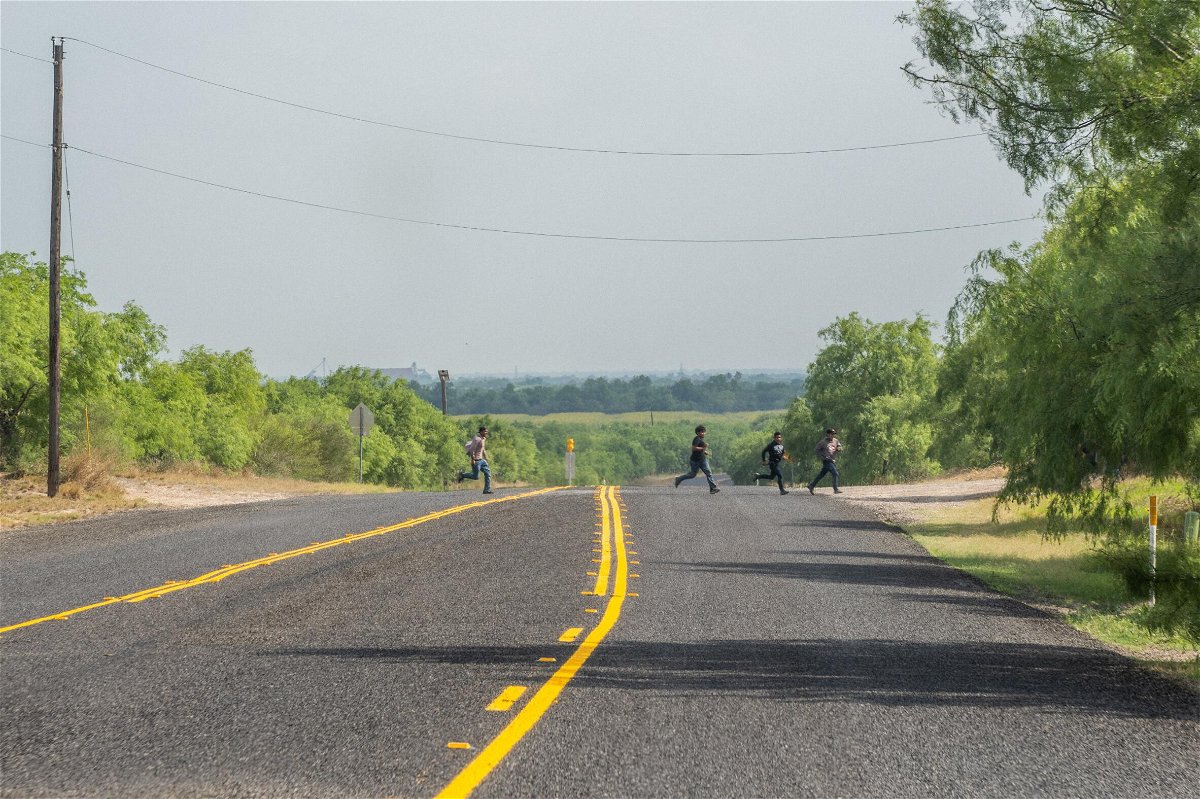DHS hasn’t seen a ‘significant decrease’ of migrants at the US-Mexico border amid ongoing efforts, Mayorkas tells CNN

A group of migrants run across a street after illegally crossing into the U.S. from Mexico on May 3 in La Joya
By Liz Stark and Priscilla Alvarez, CNN
Department of Homeland Security Secretary Alejandro Mayorkas acknowledged on Tuesday that the agency has “not seen a significant decrease” in migrants coming to the US-Mexico border despite its efforts to restrict the flow.
In an exclusive interview with CNN’s Priscilla Alvarez, Mayorkas said, “We’re seeing about a seven-day average of over 7,500 people, so we have not seen a significant decrease in the flows.”
In April, US Border Patrol stopped border crossers 201,800 times, a 4% drop from March, according to newly released data from US Customs and Border Protection. But numbers remain at historic highs, straining resources.
The secretary, who was in Texas for a border visit, also said that his agency was working with Mexico to prepare for a potential surge of migrants at the southern border if a Trump-era pandemic restriction is lifted this month.
“We are working very closely with our partners to the south, with Mexico, in anticipation of a potential surge in a post-Title 42 environment,” he said, citing information sharing, patrolling along the border and interdicting smugglers.
Mayorkas’ remarks come amid uncertainty over the future of the pandemic restriction known as Title 42. The public health authority, which allows officials to turn migrants away at the US-Mexico border, is set to end on May 23, but an ongoing lawsuit may thwart those plans. The department has been actively preparing for a potential surge in migrants when the authority lifts, Mayorkas has said.
That planning includes reaching arrangements with countries in the region where migrants come from or pass through. DHS is working to strike migration agreements with many countries, though those arrangements might vary by country, Mayorkas told CNN. The US has already struck agreements with Costa Rica and Panama.
Asked if DHS is prepared to ramp up deportations should Title 42 be lifted, Mayorkas answered, “Yes, we are,” emphasizing his department’s plans for “expanded use of expedited removal.”
“Recent border crossers are in fact a priority for enforcement in the guidelines that I issued on September 30 of last year,” Mayorkas said. “And so there will be consequences.”
DHS has previously outlined plans to expand use of a fast-track deportation procedure known as “expedited removal,” which allows immigration authorities to remove an individual without a hearing before an immigration judge. People subject to deportation, including expedited removal, are generally banned from entering the US for five years.
“The fact of the matter is, if one qualifies for relief, then one can remain here in the United States. That’s what the law provides. If one cannot, one is removed and removed as expeditiously as possible. That is the model that we follow. That is the model that the law envisions,” Mayorkas said, adding that the Biden administration is working with countries to accelerate the process.
Border Patrol officials told Mayorkas on Tuesday that reimplementing consequences for illegal border crossings could reduce the number of unlawful crossings by single adults, which have increased, according to a reporter traveling with the secretary.
GOP pushback
Amid ongoing efforts to prepare for a surge, the administration has had to contend with pushback from Republicans over the handling of the border. Last month, Texas began busing migrants released from custody to Washington, DC, on a voluntary basis, after launching its own operation on the border.
“We have a long-standing history of cooperating with state and local officials. What is helpful to us is to continue in that cooperation and collaboration,” Mayorkas told CNN.
“When the patrols are coordinated by the [Department of Public Safety], the state authorities, with our border patrol authorities — that’s a force multiplying effect. When it’s uncoordinated and not collaborative, it could be quite detrimental to our efforts and interfere with our enforcement efforts, and possibly facilitate our adversaries,” he added.
Some Republicans have also recently tied the situation at the border with the nationwide baby formula shortage. Republican Rep. Kat Cammack of Florida tweeted a photo last week claiming to show baby formula at a border facility, appearing to suggest migrants shouldn’t have access to formula.
Mayorkas called the argument “repugnant from a humanitarian perspective.”
“First and foremost, we have a law that we must adhere to, and we adhere to the law as law enforcement needs and should do,” he said.
“There is an operative decision by the courts that compel us to care for minors in our custody and control. And in fact, the prior administration ran afoul of that law and was disciplined and complied with it subsequently.”
Border facilities often have baby formula on hand — and have for years — as families are among those who cross the US southern border.
This story has been updated with additional developments Tuesday.
The-CNN-Wire
™ & © 2022 Cable News Network, Inc., a WarnerMedia Company. All rights reserved.